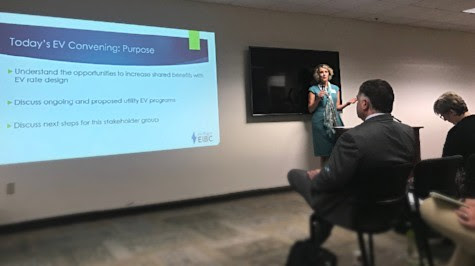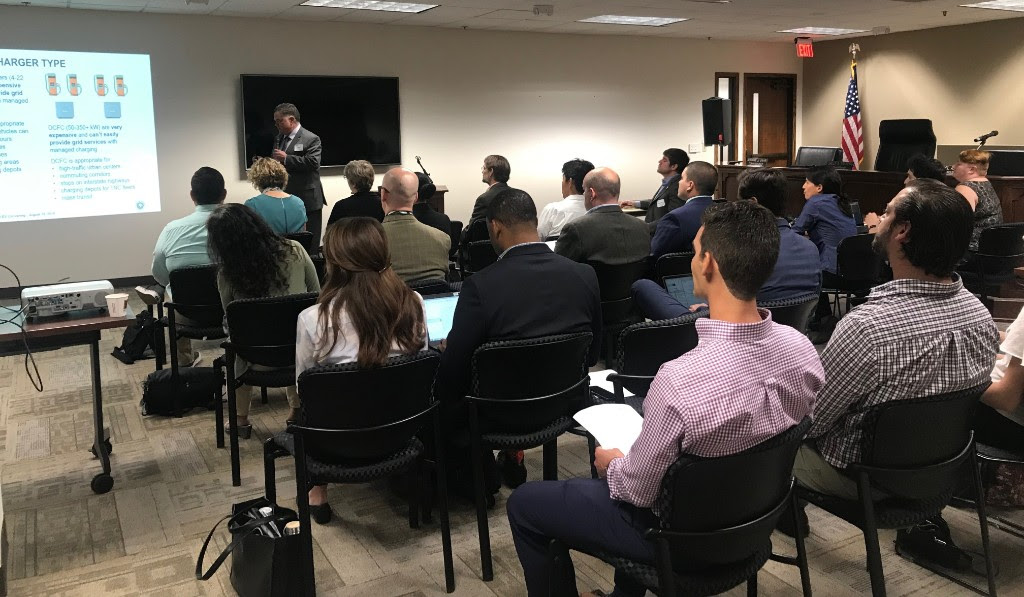Recent Posts
Blog Categories
- Newsletter (416)
5th EV Convening: Rate Design and Existing Programs


Robert Jackson next provided an update on MAE’s study of EV infrastructure needs. This effort has focused specifically on engineering design considerations but has not included a policy analysis yet. Some of the key take-aways include that DCFC is critical to building the necessary infrastructure to meet the needs of Michigan’s drivers and economy. The next steps as Jackson outlined them include, the drafting and circulation of an EV charging infrastructure roadmap based on the work MAE has invested to this point. The report will be ready later this year and will inform the spending of the VW settlement funding. Jackson shared that the strategy for the deployment of the VW settlement funds is to allocate the money over the course of three years in equal amounts.
In the afternoon, we featured a panel discussion to provide an update on utility initiatives and pilot programs on EVs. The panel featured Camilo Serna, Vice President of Corporate Strategy of DTE Energy, Scott Weber, Director of Alternative Energy Solutions of Consumers Energy, and Sam Hogg, Director, Business Origination at Wolverine Power Supply Cooperative. Serna began with an overview of DTE Energy’s proposed EV program, which includes $1.6 million for customer education, $1.5 million in residential rebates for charging infrastructure, and $10 million for rebates for public charging infrastructure including DCFC and Level 2 using a make-ready model. Scott Weber of Consumers Energy then outlined Consumers’ proposed program and approach to EV deployment. Weber explained that Consumers program includes rebates for residential charging infrastructure, rebates for public Level 2 and DCFC charging infrastructure using a make-ready model, as well as public education. Sam Hogg of Wolverine Power then shared the current status of EV infrastructure deployment for Wolverine Power. He highlighted some of the benefits and synergies for EV infrastructure and utility cooperatives. At Wolverine Power, the move toward EVs needs to be something that members of the cooperative want. Hogg emphasized the need for rebates for customers, demonstration projects, and the implementation of time-of-use rates. Hogg also continued to site DCFC as a challenge that Wolverine Power is moving forward to address cautiously. In particular, the overlap between Wolverine’s and Consumers Energy’s territories may limit the benefits of EVs to one utility or the other.
To close the convening, Liesl Eichler Clark led a discussion of important next steps coming out of the five EV convenings held by Michigan EIBC. Clark highlighted that EVs are clearly an industry that is growing and will serve as the underpinning for advanced mobility solutions, of which Michigan is positioned to be a leader. EVs can be a grid tool that provides smart, dynamic load, but they must be properly integrated. As the transition to EVs occurs and has implications for transportation and electricity markets, stakeholder conversations and buy-in are needed for success. Reflecting back information from the various conveners, Clark identified key next steps, including the development of more stakeholder convenings that focus on particular policy outcomes, a roadmap for the next administration driven by a gaps assessment, and an initiative to take real action around customer awareness.
The audience also identified the following topics for further engagement:
- The need to educate and engage with auto dealerships
- Support for cities and communities in promoting EVs
- Possible business models for DCFC charging and the need to engage site hosts
Mobility Newsclips
Michigan
- DTE Energy proposed a three-year, $13 million electric vehicle pilot program to develop charging infrastructure. The utility also proposed rate increases totaling $328 million.
- Ford plans to spend $4 billion on autonomous vehicles by 2023 through a new LLC.
- The Detroit Auto Show is officially moving to June and is expected to feature advanced mobility solutions more prominently.
- Michigan’s two major utilities have proposed spending a total of $20.5 million on EV pilot programs, using rates to incentivize charging during off-peak times.
- General Motors is close to hitting its 200,000-vehicle cap on EV sales that qualify for a $7,500 federal tax credit.
- Ford plans to spend $740 million to redevelop property in Detroit that will be used in part for electric vehicle development.
National
- Electric vehicle charging developer Volta Charging raised $35 million in Series C funding led by Invenergy Future Fund and Activate Capital Partners.
- The Trump administration proposed weakening Obama-era federal fuel efficiency standards, while 19 states push back.
- A study has found that autonomous driving won’t displace truckers.
- Samsung is slated to invest $20 billion in a variety of emerging industries relating to the advanced mobility industry such as AI, 5G, and auto components.
- A new study predicts that electric vehicles will account for 20% of global mileage share by 2030, indicating a significant acceleration in EV adoption in the next several years.
- A Chinese company building electric buses in California is banking on transit managers dumping diesel.
- New England governors and Canadian leaders agree to collaborate on policies to promote electric vehicles.
- The growing market for electric vehicles has created a battery shortage as production can’t keep up with demand.
- ChargePoint CEO answers questions and shares insights about market trends for the EV market in interview with Bloomberg New Energy Finance.
Events to Watch:
Hosted in Novi, Michigan September 11-13, The Battery Show North America will bring together more than 8,000 engineers and executives and more than 600 leading suppliers across the advanced battery supply chain. The conference will cover advanced battery technologies, electric and hybrid vehicle technology, and critical power technologies. Learn more and register here.
Ceres is hosting a public forum on electric vehicles in Michigan on September 21 from 9am-11:30am at the University of Michigan Ross School of Business.
Michigan EIBC’s Annual Energy Innovator’s Gala is scheduled for Wednesday, November 14, in Lansing. Nominations will be accepted until 5:00 pm on Friday, August 31, 2018 and should be emailed to mieibc@mieibc.org. Sponsors
You’re invited to Energy Storage Innovations: Disruptive Technologies, Materials and Applications, on November 14-15 in Santa Clara, California. Register here.